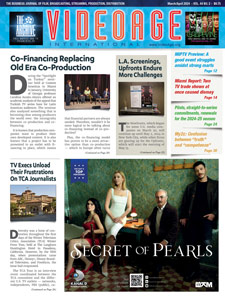Rosario Ponzio epitomizes the golden era of Italian television: The period between 1979 and 1989 when Silvio Berlusconi’s TV channels dominated the national and international markets, and when RAI had executives like Carlo Fuscagni (Canale5/RAI-1), Giampaolo Sodano (RAI-2), and Giuseppe Rossini (RAI-3).
It was also a time when Berlusconi could count on the programming talents of Carlo Freccero, Roberto Giovalli, and Giorgio Gori.
It was a time when RAI/ITC co-productions –– such as Jesus of Nazareth in 1977–– dominated NBC ratings in the U.S. Christopher Columbus, a Lorimar/RAI co-production, was also a hit when it aired on CBS in 1985.
Ponzio’s career, his contribution to the international TV distribution sector, and the environment in which it operated in Italy, Europe, and the U.S., will be the focus of the International TV Distribution Hall of Fame feature in the October (MIPCOM) edition of VideoAge.
Ponzio, who started in the entertartainment business in 1962 at age 19, worked in many different aspects of the television business, including the music side and the production and distribution side (with Lew Grade’s ITC). He also started his own independent distribution company (WTA), as well as worked at Lorimar and Warner Bros. Distribution.
This golden era was also the period in which MIFED (the world’s first film-TV trade show created by Michele Guido Franci) was considered the most important international film-TV market, and when Prix Italia attracted many top-level TV executives from around the world.
It was a time when Renato Pachetti of New York City-based RAI Corp. managed to have 10 major RAI miniseries co-productions broadcast on every U.S. TV network, and ran a U.S. TV operation larger than the BBC.
Ponzio’s career (together with the whole international TV industry) flourished when Berlusconi first launched private television networks in Italy (and in Europe) in the late 1970s, but the Italian TV sector also experienced a setback when Berlusconi became Italy’s Prime Minister for the second time, serving from 2001 to 2006. Then, Ponzio’s major client, state-owned RAI, and Berlusconi’s Mediaset, were referred to as one entity (Raiset).
Ponzio retired from the television business in 2008, and just three years later RAI Corp. closed its doors, effectively declaring the end of the golden era of Italian television.
Ponzio’s story is full of neo-realistic drama, Machiavellian politics, the romanticism of a bygone era, and commedia dell’arte humor that will make the feature entertaining, informative, and ultimately, enjoyable.












Thanks !!! No more words!
Saluto! A talented salesperson, wonderful colleague, true and loyal friend. Congratulazioni Rosario!